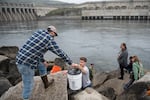The Biden administration agreed Thursday to spend more than $200 million to fully fund Native tribes’ plans to reintroduce salmon in the Upper Columbia River Basin — more than 80 years after construction of the Grand Coulee Dam rendered the fish extinct in parts of Washington, Idaho and British Columbia.
The unprecedented show of federal support is a course correction from the previous efforts of some federal agencies to resist tribal salmon restoration, which were documented in an August 2022 investigation by Oregon Public Broadcasting and ProPublica.
“This agreement is the start of fixing a wrong,” Greg Abrahamson, chair of the Spokane Tribe of Indians, said during the announcement of the agreement. “Grand Coulee Dam allowed the desert to bloom, and many faraway cities enjoyed the cheap electricity it produces, at my people’s expense.”
The announcement is also a recognition of the federal government’s long-standing violations of the fishing rights of sovereign tribes, some of whom have signed treaties with the U.S. government.
Related: The racism, and resilience, behind today’s Pacific Northwest salmon crisis
Construction of Grand Coulee Dam destroyed the Columbia River fishing site of Kettle Falls, a regional trading hub and sacred site for many salmon-dependent tribes. It cut off hundreds of miles of river habitat for salmon, who migrate to the ocean as young fish and return to their home waters to spawn as adults. Salmon and other oceangoing fish once accounted for an estimated 60% of the historic diet for Northwest Indigenous people. After the construction of Grand Coulee and other dams in the Upper Columbia Basin, those fish disappeared.

A bucket of juvenile salmon is handed to Conor Giorgi , anadromous Program Manager of Spokane Tribe, to be released into the Columbia River the morning of May 6, 2022.
Chona Kasinger for ProPublica
After nearly 80 years without those fish, a coalition of tribes along the Upper Columbia River developed in 2015 a multiphase plan to reintroduce salmon into areas where they’d been blocked.
The tribes’ long-term plan involves building hatcheries, releasing fish into waters above Grand Coulee, tracking their migration and developing plans to pass fish safely around the dams through techniques like trapping them and trucking them up or downstream. They designed the plan to ensure it does not interfere with hydropower generation at the federal government’s biggest dam on the Columbia.
Grand Coulee Dam, and Chief Joseph Dam farther downstream, together produce roughly half of all the federal hydropower on the Columbia River. Those two dams don’t currently have to accommodate salmon, which has cut into revenues at other federal dams.
As OPB and ProPublica found, tribal efforts faced resistance from the Bonneville Power Administration, the agency in charge of selling hydroelectricity from the dams and funding salmon restoration using the revenue. Tribes told Bonneville in 2019 that the federal agency’s lack of funding and stonewalling put their reintroduction efforts at least three years behind schedule.
Related: How a federal agency is contributing to salmon’s decline in the Northwest
Restoration above Grand Coulee is about more than the tribes’ own fishing. The coldwater rivers and streams above the dam are thought to offer a bastion for the fish as the climate turns warmer. Reintroduction has been endorsed by the Northwest Power and Conservation Council, a government body that oversees the fish and wildlife program funded by Bonneville, and more recently by the National Oceanic and Atmospheric Administration, which oversees endangered species recovery for salmon.
The next phase of the tribes’ plan, which this agreement funds, will cost an estimated $208 million. Under the agreement announced Thursday, which doesn’t require congressional approval, Bonneville will put $200 million toward implementing the tribes’ plan over the next 20 years. That money will come from electricity ratepayers in the Northwest. During that span, the tribes agreed to pause an existing lawsuit over the federal government’s dam operations. Bonneville executive John Hairston lauded the opportunity to use the money on “meaningful actions for fish rather than costly litigation.”
The Department of the Interior will add $8 million from the Bureau of Reclamation.

Jarred-Michael Erickson, chair for the Confederated Tribes of the Colville Reservation.
Kristyna Wentz-Graff / OPB
“We will bring salmon back where they belong — to the waters of the Upper Columbia,” Jarred-Michael Erickson, chair of the Confederated Tribes of the Colville Reservation in northeast Washington, said in a statement. “The Colville Tribes look forward to our children celebrating a Ceremony of Joy when salmon are permanently restored to their ancestral waters.”
The Coeur d’Alene Tribe, of Idaho, described the agreement as a “180-degree reversal for the federal agencies.”
This agreement over fish reintroduction in the Upper Columbia was part of a larger negotiation over the fate of the river, in which tribes and environmental advocates agreed to a pause in litigation for the past two years after the Biden administration vowed to find a solution.
“The Columbia River and its tributaries are the life spring of the Pacific Northwest, stewarded since time immemorial by tribal nations,” Brenda Mallory, chair of the White House Council on Environmental Quality, said during the announcement. “Today’s historic announcement builds on the Biden-Harris administration values of honoring long-standing commitments to tribal nations.”
The most contentious issue remains the potential breaching of four dams on the Snake River in Southeast Washington. Tribes and advocates have urged dam removal for years, and federal scientists now say it’s necessary to allow salmon to recover.
Negotiators have a deadline at the end of October.
